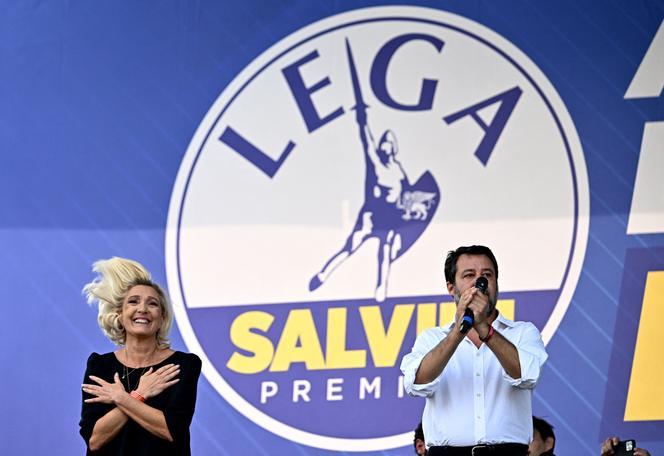


She was a nationalist among autonomists. On Sunday, September 17, at the foot of the Bergamo Alps, Marine Le Pen immersed herself for a few hours in leghista folklore at the home of her friend and ally Matteo Salvini, head of the far-right Lega Nord party in Italy. Following their joint meeting in Milan in 2019, the leader of the Rassemblement National (RN, far-right) was guest of honor at the raduno di Pontida, a first for the head of a foreign party. To regard it as a simple meeting would be to miss the point: The event features peplum music, dozens of giant regional flags, a football stadium announcer and 50,000 people on a bad day, like this year (according to the organizers). It's a gathering the likes of which the RN no longer organizes, and which Umberto Bossi, the founder of the Italian movement, had hoped would be inspired by World Youth Day. Since 1990, buses from Lega Nord strongholds have flocked to this empty land near Bergamo.
Pontida is the holy land of northern autonomists. In the 12th century, the pact of the Bergamo League was signed here, uniting towns determined to fight against the Holy Roman Empire. A few green-shirted elderly Padans – Padania is the region, roughly corresponding to the Po Valley, fantasized by northern regionalists – have concluded another. There are two strong common enemies: communism and southern Italy, which benefits far too much from the money transfers facilitated by a central Roman power described as incapable. Throughout the morning, speeches followed one another, denouncing "welfare," "uncontrolled" immigration, drugs and bureaucracy. They above all call for a federal Italy, giving power to regional executives.
The honor bestowed on Le Pen offended some of the Lega's hardliners, notably in Veneto, its other stronghold. Furious at the invitation of a figure they consider too extremist – even though they are part of a coalition led by Giorgia Meloni's post-fascist party – some skipped the Pontida event, despite Salvini's intimidation. Between two selfies with supporters, the president of the Veneto region, Luca Zaia, told Le Monde he was moderately enthusiastic: "Our doors are open to everyone, it's mainly a party for supporters. You know, we welcomed [former Partito Democratico leader] Massimo D'Alema, who was at the opposite end of the political spectrum. We're autonomists. The rest doesn't interest me."
There was a political incongruity in Le Pen's presence. When the leaders of the Lega took to the podium to repeat the expression "masters at home," they were referring to their town, their province or at most, their region. In contrast, the RN's "On est chez nous !" ("We are at home!") is resolutely nationalistic and traditionally suspicious of regional identities. Without ignoring the diversity of cultures, the RN – historically the "National Front for French Unity" – exalts only "French identity," and its leader makes "the nation" the be-all and end-all of her political discourse. Not without irony, it was a "declaration of the rights of nations and peoples," with no mention of regional identities, that she came to Pontida to present. The leghiste supporters hostile to her presence were in the minority, however, and the crowd on Sunday ranged from indifferent to enthusiastic about the woman they have become accustomed to seeing alongside Salvini.
You have 43.09% of this article left to read. The rest is for subscribers only.
